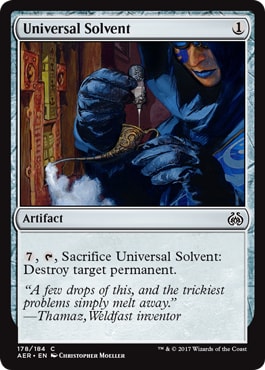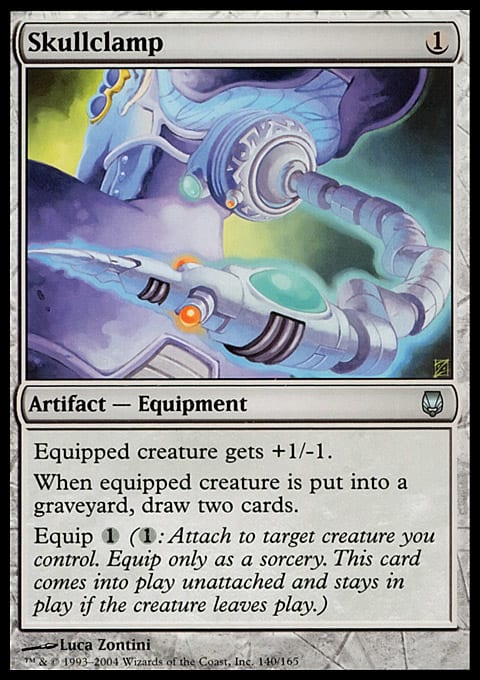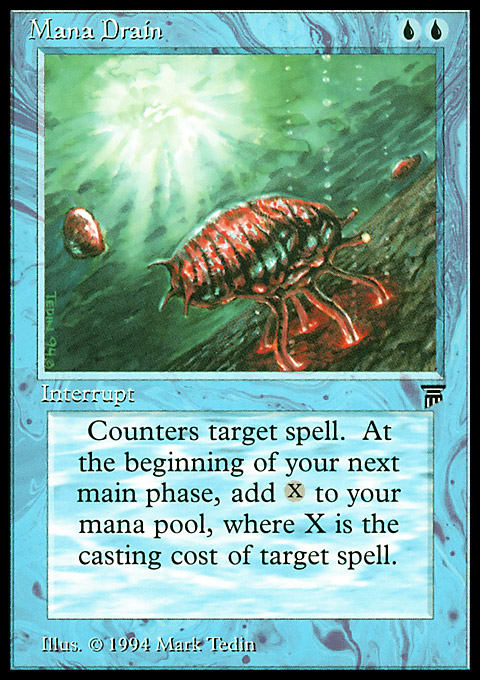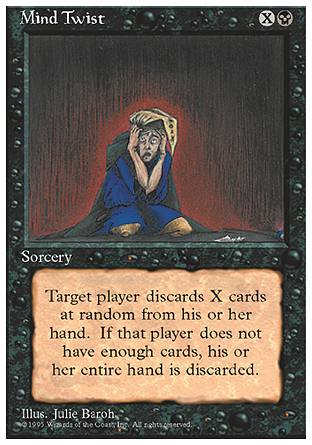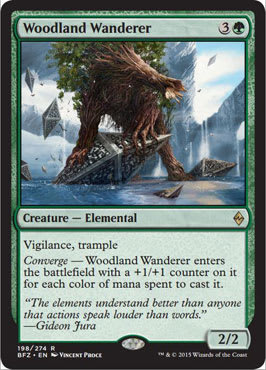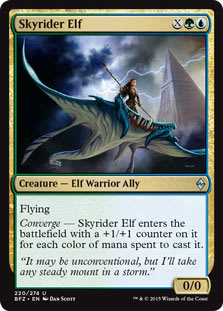One of the biggest complaints about Magic in the last few years is that formats get stale faster than ever before. The good decks are usually found and tuned rather quickly, which leads to a feeling that the format is "solved" and there is no real room for innovation or new ideas.
Of course this isn't always entirely true, but the sheer volume of Magic that is played on both Magic Online and MTG Arena tends to push things in that direction. Acquiring cards is simple and logistics-free, especially with the advent of card rental services, meaning players can switch cards, sideboards, or even entire decks on a whim. Add this to some, um, questionable power level printings over the last year or so and it's not hard to see how people could become disillusioned with the current crop of competitive Constructed formats.
This has been somewhat remedied over the last year or so with the introduction of two new formats, Pioneer and the MTG Arena-only Historic. Pioneer especially was extremely exciting for the first few months it existed, providing players a space to brew to their heart's content. However, new printings of combo enablers and time to settle into a solidified metagame has slowed the excitement around the format. Historic is going through its early stages right now, but stands to follow the same trajectory. Formats being fleshed out and coalescing into a fairly solid metagame is just how competitive Magic works; a lot of the fun is in the discovery, but once the world has been mapped out some of that feeling of exploration feels lost.
But what if I told you that the volume of games played and ease of access to cards on the online Magic platforms could be utilized as a feature, not a bug?
For the last decade I've been a vocal proponent that some sort of "Build Your Own Standard" format should be a mainstay on Magic Online. Every month set forth some sort of unique deck-building requirement, hold a big weekend event for it, and then move on to the next format next month. You end up with a fresh and exciting format that encourages brewing, without needing to worry about anything getting screwed up long term or needing to add new sets.
A short list of the benefits:
- Everyone starts the format on page one, as there are no decklists or content to copy. Players get to flex their deck-building muscles and work together to try and tackle something new, one of the most exciting aspects of Magic.
- Breaking the format is also a feature, not a bug. If someone breaks it... awesome! That is the goal of any format, and the player or players that break it likely get rewarded with a big and exciting win. Because it's a one shot deal format, there are no lasting repercussions of a broken or stale format.
- Players get to play with cards that have been long forgotten. There are tons of awesome Magic cards that just can't cut it in Legacy or Modern, but could end up being the star players of a smaller format. This gives player's collections more value and taps into the 25 year history of the game as a resource.
- From a secondary market perspective, this also breathes new life into cards that haven't had value in a very long time. With the popularity of card rental services this may not matter as much, but there a bunch of cards rotting in people's Magic Online accounts that probably haven't been played in a long time.
- Balance isn't nearly as important as with a long standing format. Some sets have dumb cards in them, but having to deal with Skullclamp or Oko, Thief of Crowns for only one month or one tournament is an interesting exercise. There's no fear of never being able to escape it.
- Magic players simply love nostalgia and this is a great way to tap into that. Furthermore, it can give newer players a taste of cards they never got a chance to play with that maybe aren't good enough for Cube or other formats.
The bad news is that Magic Online has never gone ahead and done anything like this.
The good news is that others have stepped in to do so!
The last two months I've gotten to play in "Set Roulette" tournaments held by The Mythic Society, which are essentially what I've been asking for from Magic Online for over a decade. The info blurb from their tournament rules:
The Constructed Set Roulette format was originally created by Pascal Maynard and his local friends with the intent of maximizing and showcasing players' deck-building skills. Because of today's information traveling so fast thanks to the internet and the amount of games that are played in relevant formats, we've been having the feeling that Magic's deck-building aspect is not like it used to be.
We came up with the idea of determining at random 2 Big Expansions, 3 Small Expansions and a Core Set to become the Constructed format that we would all play on an upcoming weekend. It was an absolute blast to brew for a few days and gather and play to see who came up with what. Imagine doing that online with TONS of players!"
I love it.
While it would be much cooler if this was officially held by Magic Online, and thereby could run the tournament in program, this is the next best thing. The sets are chosen a week in advance, which gives everyone ample time to explore the format and put together their decks for the main tournament. They've held two of these now and both have been great fun. The most recent had this set mix:
- Invasion
- Battle for Zendikar
- Master Edition 3
- Legions
- Darksteel
- Dissenssion
Approaching a brand new format like this is sort of like how one would approach a new format normally, but there's very little preset information. When Standard rotates or even when a new format like Pioneer is made, we have a starting point of the decks that were good prior to rotation (or in old Standard formats in the case of Pioneer). In Set Roulette, all we have to go on are the pedigrees of the cards themselves, some of which may have not seen serious play in over a decade.
As such, the primary focus should be finding the best cards in the format and going from there. With this mix of sets, it wasn't too hard.
All three of these cards are banned in Legacy, while some of them have also found themselves on other banlists as well over the course of Magic's history. When you isolate the outlier cards, you start to get a picture of how the format is going to play out and what things are important. All three of these cards can wildly swing games, so finding ways to both use them profitably as well as combat them is paramount.
There are other factors at play, like which removal spells are the best (and conversely what are their blind spots), what mana fixing lands are available, what acceleration is there, and so on, and this mimics a lot of how normal formats work. Putting all this together, I came up with this:
Jim Davis | Set Roulette | 11th Place
- Creatures (21)
- 2 Patagia Viper
- 3 Old Man of the Sea
- 4 Catacomb Sifter
- 4 Coiling Oracle
- 4 Elves of Deep Shadow
- 4 Trygon Predator
- Planeswalkers (1)
- 1 Ob Nixilis Reignited
- Sorceries (9)
- 2 Bone Splinters
- 3 Mind Twist
- 4 Three Visits
- Enchantments (4)
- 4 Utopia Sprawl
- Artifacts (5)
- 1 Sword of Fire and Ice
- 4 Skullclamp
- Lands (20)
- 1 Island
- 5 Forest
- 2 Blinkmoth Nexus
- 4 Bayou
- 4 Breeding Pool
- 4 Tropical Island
- Sideboard (15)
- 1 Bone Splinters
- 1 Carry Away
- 1 Dispel
- 1 Disrupt
- 2 Flash Flood
- 1 Mind Twist
- 2 Nether Void
- 1 Old Man of the Sea
- 1 Oxidize
- 1 Plaxmanta
- 2 Recoil
- 1 Sword of Light and Shadow
Now of course, the reality of Set Roulette is that this decklist won't ever be relevant again now that the tournament is over, but it serves as a great example of how the format works. I did my best to use as many of the most broken cards as possible (Skullclamp and Mind Twist), while also trying to be good against the best cards in the format as well.
The eventual winner had a similar idea, as both finalists worked together on a deck that wasn't too far off of mine:
Ben Weitz | Set Roulette | 1st Place
- Creatures (19)
- 3 Skyrider Elf
- 4 Eldrazi Skyspawner
- 4 Elves of Deep Shadow
- 4 Trygon Predator
- 4 Woodland Wanderer
- Instants (4)
- 4 Recoil
- Sorceries (4)
- 4 Mind Twist
- Enchantments (4)
- 4 Utopia Sprawl
- Artifacts (6)
- 2 Sword of Fire and Ice
- 4 Skullclamp
- Lands (23)
- 3 Forest
- 1 Volcanic Island
- 3 Scrubland
- 4 Bayou
- 4 Breeding Pool
- 4 Lumbering Falls
- 4 Tropical Island
Recognizing the relative weakness of removal spells in the format, both Ben and the other finalist, Jarvis Yu, properly discovered that the converge creatures were well above rate and hard to kill in the format, despite never making a splash in Standard when they were legal.
This is the beauty of a format like Set Roulette.
Not every card in Magic gets a fair shake. Sometimes you're Shadowmage Infiltrator in a world where Wild Mongrel is the best creature. Sometimes you're Commence the Endgame in a world where Teferi, Time Raveler and Narset, Parter of Veils are popular. Sometimes you're Dovin, Grand Arbiter in the same format as Teferi, Time Raveler. Sometimes you're Primal Amulet when people are gunning hard for Aetherworks Marvel and God-Pharaoh's Gift. Some cards are really cool or quite good, but just don't line up the right way in their own format.
Set Roulette is a really fun way for those cards to shine.
I can only hope that Magic Online (and possibly MTG Arena too) see the light that there's so much more they can do with the flexibility that the digital platform provides them. Things like Cube draft are great, but these sorts of special events and formats can be done very easily on an online platform and really take advantage of the different medium.
And if you're a paper player, you can get in on the action too! Maybe you've got old Standard cards from past formats laying around, or big boxes of commons in your closet. You could do a pauper version of set roulette, or even sort out some sets and divvy them out directly to play with different sets. And realistically, old cards that don't see play are pretty cheap too!
The discovery and deck-building in new formats is one of the most enjoyable parts of Magic, and with so many cards printed over the years there are infinite permutations to how we can put them together. If you're unhappy with Standard or Legacy or whatever your format may be, don't be afraid to be creative and try different things. Complaining on Twitter about Magic is all right, but actually playing Magic is a lot more fun!
















